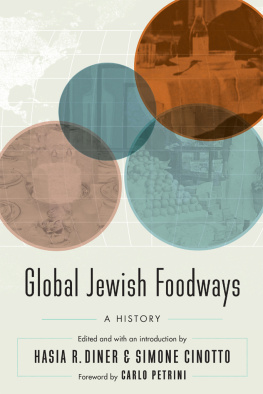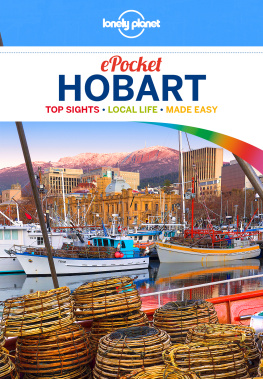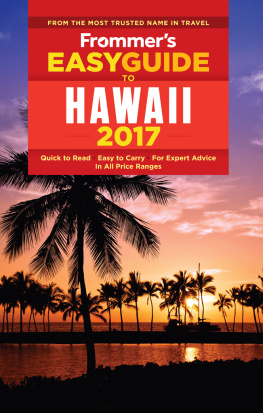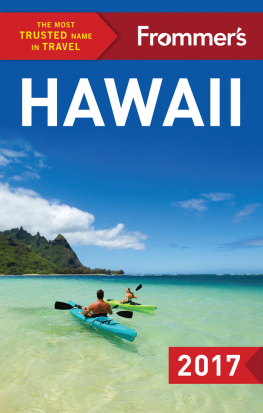
The Foodways of Hawaii
Offering diverse perspectives on Hawaiis food system, this book addresses themes of place and identity across time. From early Western contact to the present day, the way in which people in Hawaii grow, import, and consume their food has shifted in response to the pressures of colonialism, migration, new technologies, and globalization. Because of Hawaiis history of agricultural abundance, its geographic isolation in the Pacific Ocean, and its heavy reliance on imported foods today, it offers a rich case study for understanding how food systems develop in-place. In so doing, the contributors implicitly and explicitly complicate the narrative of the local, which has until recently dominated much of the existing scholarship on Hawaiis foodways. With topics spanning GMO activism, agricultural land use trends, customary access and fishing rights, poi production, and the dairy industry, this volume reveals how local food is emplaced through dynamic and complex articulations of history, politics, and economic change.
This book was originally published as a special issue of Food, Culture & Society.
Hiilei Julia Hobart is a Postdoctoral Fellow in Native American and Indigenous Studies at Northwestern University, USA. Her work looks at the points of intersection between foodscapes and indigeneity. She is especially interested in the history of commodity ice and refrigeration in the Pacific, the development of new technology in the nineteenth century, the affective registers of comfort and home-making, and indigenous embodiment and environmental knowledge.
The Foodways of Hawaii
Past and Present
Edited by
Hiilei Julia Hobart
First published 2018
by Routledge
2 Park Square, Milton Park, Abingdon, Oxon, OX14 4RN, UK
and by Routledge
711 Third Avenue, New York, NY 10017, USA
Routledge is an imprint of the Taylor & Francis Group, an informa business
2018 Association for the Study of Food and Society
All rights reserved. No part of this book may be reprinted or reproduced or utilised in any form or by any electronic, mechanical, or other means, now known or hereafter invented, including photocopying and recording, or in any information storage or retrieval system, without permission in writing from the publishers.
Trademark notice: Product or corporate names may be trademarks or registered trademarks, and are used only for identification and explanation without intent to infringe.
British Library Cataloguing in Publication Data
A catalogue record for this book is available from the British Library
ISBN 13: 978-1-138-57411-3
Typeset in FeniceStd
by RefineCatch Limited, Bungay, Suffolk
Publishers Note
The publisher accepts responsibility for any inconsistencies that may have arisen during the conversion of this book from journal articles to book chapters, namely the possible inclusion of journal terminology.
Disclaimer
Every effort has been made to contact copyright holders for their permission to reprint material in this book. The publishers would be grateful to hear from any copyright holder who is not here acknowledged and will undertake to rectify any errors or omissions in future editions of this book.
Contents
Citation Information
The chapters in this book were originally published in Food, Culture & Society, volume 19, issue 3 (September 2016). When citing this material, please use the original page numbering for each article, as follows:
Introduction
Local: Contextualizing Hawaiis Foodways
Hiilei Julia Hobart
Food, Culture & Society, volume 19, issue 3 (September 2016), pp. 427436
Chapter 1
Homegrown Cuisines or Naturalized Cuisines? The History of Food in Hawaii and Hawaiis Place in Food History
Rachel Laudan
Food, Culture & Society, volume 19, issue 3 (September 2016), pp. 437460
Chapter 2
Snowy Mountaineers and Soda Waters: Honolulu and Its Age of Ice Importation
Hiilei Julia Hobart
Food, Culture & Society, volume 19, issue 3 (September 2016), pp. 461484
Chapter 3
Dairys Decline and the Politics of Local Milk in Hawaii
Clare Gupta
Food, Culture & Society, volume 19, issue 3 (September 2016), pp. 485516
Chapter 4
Customary Access: Sustaining Local Control of Fishing and Food on Kauais North Shore
Mehana Blaich Vaughan and Adam L. Ayers
Food, Culture & Society, volume 19, issue 3 (September 2016), pp. 517538
Chapter 5
Cultural Traditions and Food: Knaka Maoli and the Production of Poi in the Heeia Wetland
Hklani K. Aikau and Donna Ann Kamehaik Camvel
Food, Culture & Society, volume 19, issue 3 (September 2016), pp. 539562
Chapter 6
Farmer Typology in South Kona, Hawaii: Whos Farming, How, and Why?
Noa Kekuewa Lincoln and Nicole Ardoin
Food, Culture & Society, volume 19, issue 3 (September 2016), pp. 563586
Chapter 7
From the Sugar Oligarchy to the Agrochemical Oligopoly: Situating Monsanto and Gangs Occupation of Hawaii
Andrea Brower
Food, Culture & Society, volume 19, issue 3 (September 2016), pp. 587614
For any permission-related enquiries please visit: http://www.tandfonline.com/page/help/permissions
Notes on Contributors
Hklani K. Aikau is an Associate Professor of Native Hawaiian and Indigenous Politics in the Department of Political Science at the University of Hawaii at Mnoa. She currently serves as Director of the General Education Office at UHM. She is the author of A Chosen People, a Promised Land: Mormonism and Race in Hawaii (2012) and is currently working on an ethnography of the wetland restoration project described in this volume.
Nicole Ardoin is an Assistant Professor with a joint appointment in the Graduate School of Education and the Woods Institute for the Environment at Stanford University, USA. Professor Ardoins research focuses on environmental behavior as influenced by environmental learning and motivated by place-based connections.
Adam L. Ayers is a PhD candidate in the Department of Urban and Regional Planning at the University of Hawaii at Mnoa. He is also a Social Scientist for the Joint Institute of Marine and Atmospheric Research (JIMAR) in the Socioeconomics Program at the NOAA Pacific Islands Fisheries Science Center.
Andrea Brower is an activist from Hawaii and a PhD candidate at the University of Auckland, Aotearoa/New Zealand.
Donna Ann Kamehaik Camvel is working on a PhD in the Department of Political Science with a specialization in Indigenous politics at the University of Hawaii at Mnoa.
Clare Gupta is an Assistant Cooperative Extension specialist in the Department of Human Ecology at UC Davis, USA. She specializes in community food systems.
Hiilei Julia Hobart is a Postdoctoral Fellow in Native American and Indigenous Studies at Northwestern University, USA. Her work looks at the points of intersection between foodscapes and indigeneity. She is especially interested in the history of commodity ice and refrigeration in the Pacific, the development of new technology in the nineteenth century, the affective registers of comfort and home-making, and indigenous embodiment and environmental knowledge.













